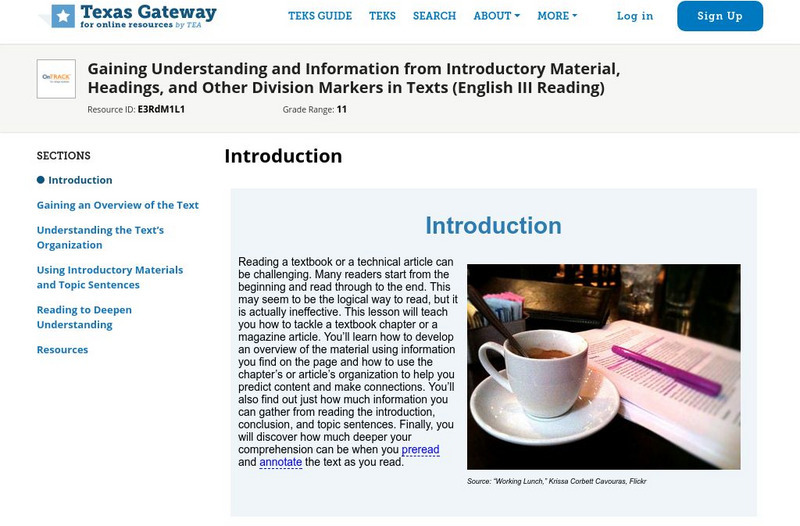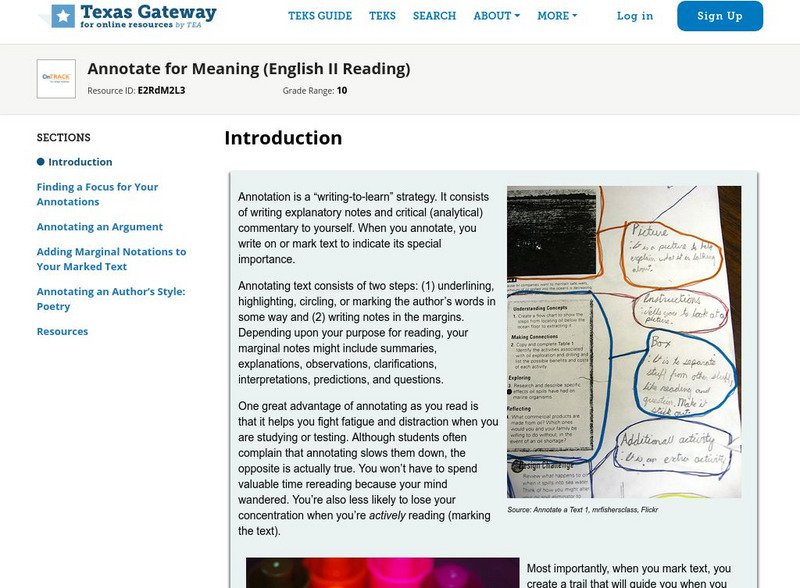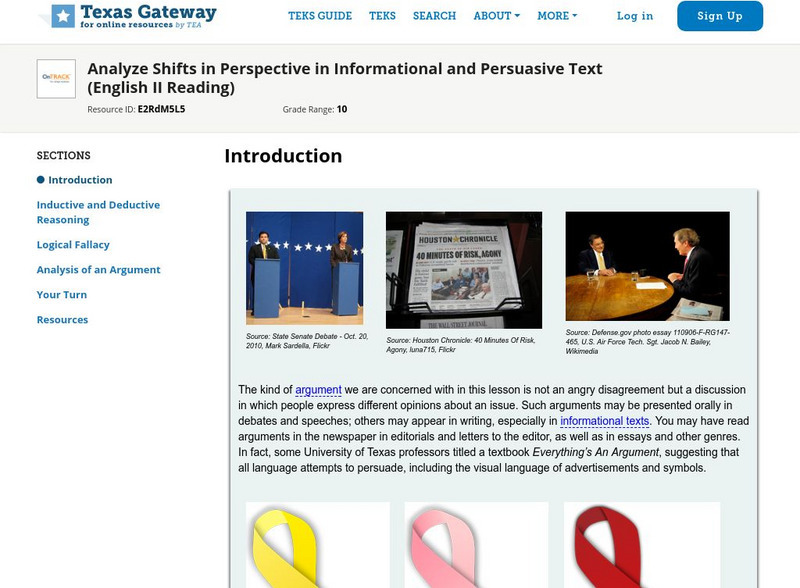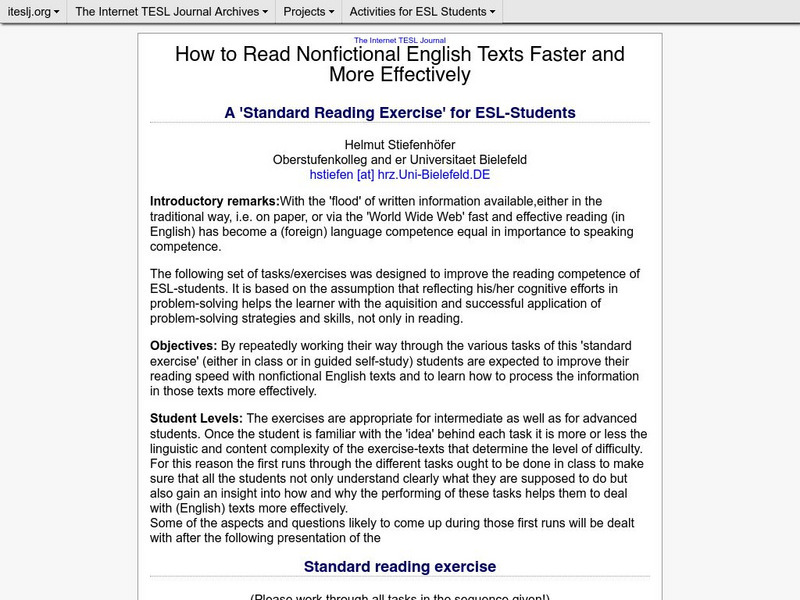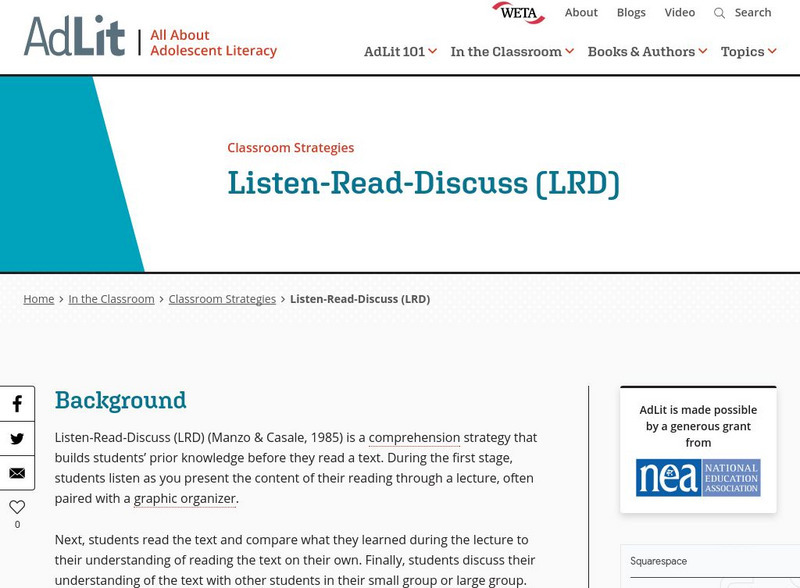Hi, what do you want to do?
National Endowment for the Humanities
Charles Baudelaire: Poète Maudit (The Cursed Poet)
After learning the main ideas of the Decadent movement, students work in small groups to read and translate poems by the French poet Charles Baudelaire using basic etymology skills. They then read the accurate English translations to see...
Curated OER
Off the Record
Music reflects culture and culture is reflected in popular music. Reading an article on how hip-hop has affected the lives of two young men of different races launches an investigation of the development and influences of various musical...
Read Works
Read Works: Passages: Predicting the Future
[Free Registration/Login Required] Students read an informational text about the predictions of a futurist and answer questions on comprehension, text support, main idea, vocabulary, and more. Links to a paired text and paired text...
Sophia Learning
Sophia: Annotating Text
This slideshow focuses on the reading strategy, annotating text. It defines the term and purpose, lists types of annotation, explains what to annotate, and suggests how readers develop their own method.
Sophia Learning
Sophia: Critical Reading as a Learning Strategy
This tutorial focuses on critical reading using a downloadable PowerPoint presentation, "Critical Reading 101," which includes separating fact from opinion, 6 propaganda techniques, and 6 common fallacies in reasoning. Also provided is...
Other
Center for Assessment: Tools for Examining Text Complexity [Pdf]
Learn how to use several tools to determine text complexity and readability of text for your students.
CommonLit
Common Lit: "Propaganda: Battling for the Mind" by Shelby Ostergaard
CommonLit.org is a wonderful resource to use in a Language Arts classroom. Each story or article is accompanied by guided reading questions, assessment questions, and discussion questions. In addition, students can click on words to see...
Texas Education Agency
Texas Gateway: Understand Information From Introductory Material, Headings, Etc.
In this lesson students learn how to develop an overview of the material using information gained from text organization to help predict content and make connections. They also to gather information from reading the introduction,...
Texas Education Agency
Texas Gateway: Annotate and Analyze a Paired Passage: Practice 2
[Accessible by TX Educators. Free Registration/Login Required] In this lesson, students will read and annotate a pair of texts to make inferences, draw conclusions, and synthesize ideas and details using textual evidence.
Texas Education Agency
Texas Gateway: Annotate for Meaning (English Ii Reading)
This lesson focuses on annotating text to aid in understanding of the text including annotating an argument and poetry. It also provides tools and techniques for marking text.
Other
Carson Newman College: Close Reading of a Literary Passage [Pdf]
Provides a number of questions that students can ask themselves about a literary passage when doing a "Close Reading" and following this with an organized piece of writing. CCSS.ELA-Literacy.CCRA.R.5
Thinkport Education
Thinkport: Citing Textual Evidence: Changing Oceans
Learn how to cite evidence to support ideas presented in a science article about oceans.
Annenberg Foundation
Annenberg Learner: Analyzing Complex Text
During this lesson plan, students will use close reading strategies to analyze aspects of the setting in The Adventures of Huckleberry Finn by Mark Twain. [7:57] CCSS.ELA-Literacy.CCRA.R.10, RL.11-12.10a/b Text Complexity
Texas Education Agency
Texas Gateway: Analyze Shifts in Perspective in Informational & Persuasive Text
[Accessible by TX Educators. Free Registration/Login Required] In this lesson, you will read informational texts and identify varying perspectives in different arguments on the same topic. You will also analyze the reasoning and the...
Thinkport Education
Thinkport: Read Like This, Too Central Ideas and Supporting Details
Begin practicing skills that will help identify the central idea and details while reading literary nonfiction.
Thinkport Education
Thinkport: Read Like This,too Find Central Ideas, Details in Literary Nonfiction
A module to help you practice skills that will help identify the central idea and details while reading literary nonfiction.
Thinkport Education
Thinkport: Read Like This a Strategy for Close Reading of Literature
Learn and practice close reading strategies to help increase your understanding of how to approach challenging and complex texts.
Thinkport Education
Thinkport: Read Like This: Using Informational Text Strategies
In this module practice working with informational text.
Thinkport Education
Thinkport: Research Simulation Task
Engage in a research process by analyzing a variety of print and non-print texts on the subject of bullying, identifying evidence regarding the topic, and using this new information to respond to questions about the text and the topic.
TESL Journal
The Internet Tesl Journal: Reading Nonfiction Texts Fast
Article lists a series of steps and tasks to make reading texts more efficient and clear. Written primarily for teachers of ESL students but tasks work for all students.
Capital Community College Foundation
Guide to Grammar and Writing: Classification and Analysis
This site provides some help reading an essay that deals with the classification and analysis of a piece of literature. Offers some instruction about the type of essay, a sample text, and guiding questions to help you analyze your own...
California State University
Reading Strategies From the University of Waterloo
Brief and easy to read, this California State University Northridge site lists strategies for getting the most of your reading. Geared for reading texts and technical material.
AdLit
Ad lit.org: Classroom Strategies: Listen Read Discuss (Lrd)
Listen-Read-Discuss (LRD) (Manzo & Casale, 1985) is a comprehension strategy that builds students' prior knowledge before they read a text. During the first stage, students listen as you present the content of their reading through a...
AdLit
Ad lit.org: Classroom Strategies: Inferential Reading
Teaching students to "read influentially" helps them learn how to read more strategically. This technique is derived from the teaching model that learners develop knowledge via the process of interpreting new information in light of past...








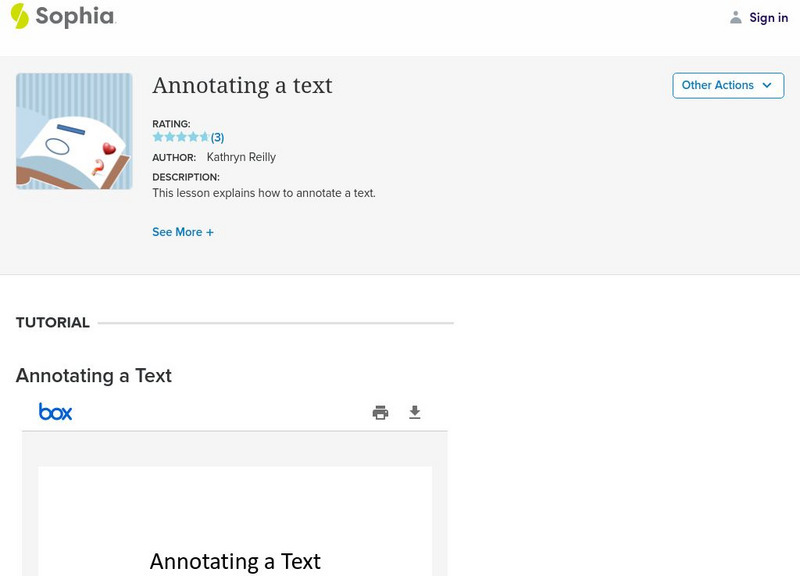

![Center for Assessment: Tools for Examining Text Complexity [Pdf] Professional Doc Center for Assessment: Tools for Examining Text Complexity [Pdf] Professional Doc](https://static.lp.lexp.cloud/images/attachment_defaults/resource/large/FPO-knovation.png)
